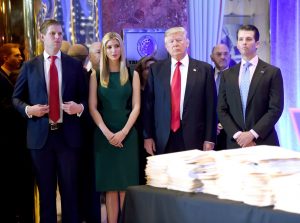Trump Financial Ethics Watch Series
Ethics Analysis: Trump’s Conflicts of Interest
Part 1 in SPI’s Trump Financial Ethics Watch Series
As President Donald Trump has adjusted to his first month in the White House, a host of questions have arisen about the future of his multi-billion dollar empire during his time in the Oval Office. After all, President Trump represents something entirely new in the White House; he will be the first president to be actively involved in over 500 local and global companies (as listed on his FEC filing) with ongoing litigation against his businesses and a nine-figure debt to a foreign bank. Blurred lines between his political position and business empire bring up a host of questions regarding conflicts of interest between Mr. Trump’s White House and his sprawling businesses. READ MORE…
Ethics Analysis: Foreign Bribery
Part 2 in SPI’s Trump Financial Ethics Watch Series
Trump’s Repeal of Disclosure of Payments Rule for Oil and Mining Companies
On February 14, President Trump signed his first piece of legislation, H.J. Resolution 41, repealing an anti-corruption measure that required oil and mining companies to disclose their payments to foreign governments. The resolution repeals a Securities and Exchange Commission (SEC) rule written under the 2010 Dodd-Frank financial reform law. The purpose of the SEC rule was to safeguard against corruption in resource-rich countries by mandating companies on US stock exchanges disclose the royalties and other payments that oil, natural gas, coal and mineral companies make to governments. The administration and supporters of the repeal argue the disclosure adds compliance costs to American energy companies and is a competitive disadvantage. However 38 of the world’s 100 largest oil and gas companies are subject to public disclosure mandates including Russian firms Rosneft and Gazprom. READ MORE…
When Businessmen Rule the State
Part 3 of SPI’s Trump Financial Ethics Watch Series
Striking parallels between two billionaire businessmen heads of state, now exiled Thaksin Shinawatra and Donald Trump.
“If you monitor what Donald Trump is saying, he’s bluffing, the man. That’s really the culture of a businessman.” While there is “some similarity” between [us], [our] personal attitudes “may be not the same”. “But the cultures are very similar, the culture of a businessman”. — Thaksin Shinawatra, Financial Times
Flooding the Swamp: The Case of Michael Catanzaro
Part 4 of SPI’s Trump Financial Ethics Watch Series
Walter Shaub, former director of the Office of Government Ethics (OGE) had a difficult time getting the White House to cooperate with a routine request to get copies of ethics waivers of Trump’s appointees. While the White House eventually released the waivers, many were undated and unsigned. But self-proclaimed politically-neutral Shaub held true to his position, stating in an interview with CBS that “America should have the right to know what the motivations of its leaders are, and they need to know that financial interests, personal financial interests, aren’t among them. READ MORE…
Conflicts of Interest: Wilbur Ross
Part 5 of SPI’s Trump Financial Ethics Watch Series
President Donald Trump’s administration’s conflicts of interests have plagued the administration since this presidency began. Wilbur Ross, the Secretary of Commerce, who wondered why furloughed federal workers don’t get loans, is no exception. Ross over reported his assets’ worth and invested in companies associated with the Chinese and Russian governments (“Lies, China, and Putin”). The Secretary of Commerce is responsible for supervising the United States economic relations with China and Russia, yet he has personal entanglements with these nations. Wilbur Ross and his family’s investments have created a conflict of interest as he serves in President Trump’s cabinet. READ MORE…

